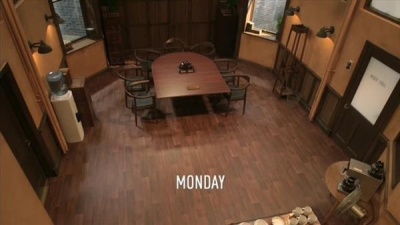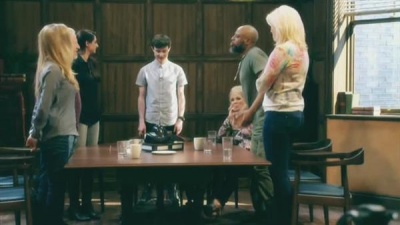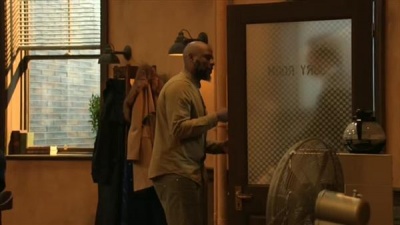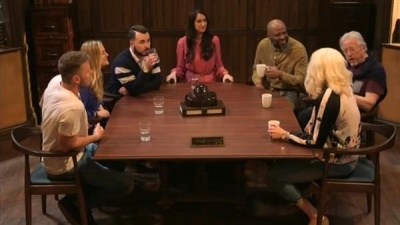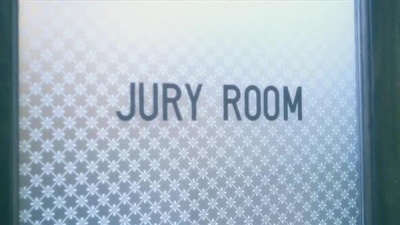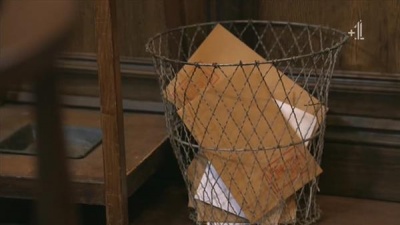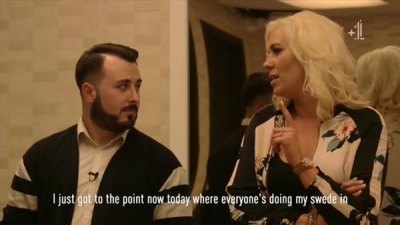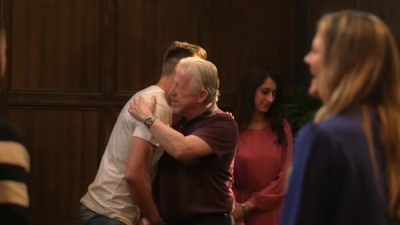Weaver's Week 2016-07-24
Last week | Weaver's Week Index | Next week
People are stuck in a room, with only a disembodied voice for company. We're not talking about the Trapped revival, are we?
Contents |
The Question Jury
Monkey for Channel 4, from 11 July
This is another Channel 4 daytime programme, currently going out at 4pm.
The concept is simple. Take some people, put them in a room, ask them general knowledge questions. Keep them in a room until they all agree on an answer. After a series of questions, get them to choose a potential winner for an all-or-nothing question.
The execution is less simple. All of the action takes place in a prepared environment – a room with a table, seven chairs, refreshments. There's a Bakelite intercom, books on the walls, a small analogue clock, and it feels like a well-polished and somewhat old-fashioned sideroom. The producers want to bring about a feeling, confinement in a hospitable place.
According to the sign on the door, this is the "jury room", and the seven players are "the jury". If we're to believe the narration, they won't be permitted to leave the jury room and adjoining washroom until the show has finished recording. Inside the room are lots of cameras – the trade knows this as a "fixed rig" production, they've set up the room so as to have all the camera angles they want.
The competition is led by "The Judge", a disembodied female voice who only speaks down the intercom to them. She selects which person will lead the jury for each question – everyone is the "foreman" for one question. The question is handed over by "the clerk", who we only ever see in shadows, and then the team are on their own.
Once they've discussed all the options, they report back to The Judge, using the show's catchphrase, "Our verdict is" and then the answer. There are reasons for this. A right answer wins money, an incorrect answer earns nothing. First two questions are worth £500, next two £1000, next two £1500, and the final question can add £2000 to the pot.
There are also speed rounds, with growing handicaps. In the first round, one player is required to remain silent. In the second, three players are to keep schtum. In the third, three players are silenced and the round will end on the first incorrect answer. These speed rounds are all ten questions in 90 seconds, no passes allowed. £50 per correct answer, doubled in the last of the speed rounds.
Because The Judge is listening throughout, it has to be clear what is a guess and what is an answer. "Our verdict is..." helps to make intentions clear. Otherwise, this would be an irritating and superfluous catchphrase.
Channel 4's press release didn't make it clear how the final worked. Was it to select one person to win the money on behalf of the jury? Or was it one person to win the money for themselves? Turns out to be the latter: work as a team, win on your own. Consensus, consensus, consensus, divergence.
At the end of the show, players who think they've done enough to be considered for the final question are invited to stand. Those seated will decide who will take the final question. Everyone will be allowed to chip in possible answers. A right answer wins thousands for the chosen one, a wrong answer wins nothing. That player leaves the game at once. The rest of the jury come back tomorrow (unless it's a Friday, when they're all discharged.)
Talk to me (like jurors do)
So there are two elements to The Question Jury. We'll come to the questions later, but we've also to consider the personal interaction. There's a cast of seven players, a large enough selection to keep variety, a small enough selection that Monday's episodes aren't "you are? and you are?". Players don't wear name tags, but are introduced by names floating near them.
A cast of seven is large enough that the viewer has to concentrate. Zap in and out of the show, and the stories make less sense. For the average viewer at home, this can be a tall order, particularly in a 4pm slot. Perhaps that explains the vintage feel: they're aiming at an older viewer, who can watch with fewer interruptions.
With editing, the producers can tell the stories they want. In retrospect, some of the stories develop through the episode, some begin but then fade away. The stories are advanced through the play, and through a break after each speed round – we'll see the players talking about the game while not in it. Having two rooms allows a little privacy, it lets players vocalise their thoughts behind the other's back.
The show's structure requires that all parts are complete in a short time. There's about ten minutes of action in each segment, and that includes a set-up and answer to each question, the quick-fire round, and a set-up and lead-out for the commercial breaks.
The result: only about five minutes of discussion about the two substantive questions. The producers use visual cues to denote a long discussion, but we're not going to be privy to that discussion.
Rare that we see an extended discussion, and it's always "I think this" "I think that", a battle of shout. Never a call to evidence, "You're wrong because.." And no chance to think about the problem rationally, "What characteristics would the right answer have?" These are narrow discussions, not wide-ranging debates.
The questions are all asked by members of the jury, reading from a paper script. We assume that they're not allowed to pass the paper around to the other members, and no-one has pen and paper.
Result? All thinking has to be done verbally. To make a case, each player has got to put it into words. Many psychological effects come into play: it's very difficult to talk and listen at the same time, and even more difficult to talk and listen and process the other ideas. First-thought bias, and recency bias, give precedence to the first and last things people hear. Loudmouths have an advantage. Loudmouths who talk and don't listen can grind their way to an answer, but it'll damage their chance in the endgame.
Some of the jury are better at reading than others. This is noticeable in the speed round, where they need to get the question out quickly and clearly. The questions don't help: many are long, many contain difficult words or tricky phrases. It might just be possible to read out all ten questions and get all ten answers in 90 seconds, but it seems designed to be impossible.
The net result is a show designed to make a style of television, it's not designed to give away masses of money. This column doesn't mind the style – it's a bit more slick than we'd like – but it's OK.
Question or Fact-check?
A quiz is only as good as its questions, and we've heard some criticism about the style and some of the research.
The style is mostly biggest / smallest / most memorable of something trivia questions. Brig Bother thought "hmm, early Million Pound Drop", and we agree with Nick. There's no logic questions, no deduction.
For a research exercise, we took the seven main questions from Monday's episode, and gave them some rigorous fact-checking. Nothing we'll discuss affected the result, as the nominated contestant got the final question wrong. And we set out to be harsh in our marking: spare the accuracy, spoil the show.
- Q1: What is the world's deadliest animal in terms of the number of human deaths it is held responsible for every year?
The team said "mosquito", and that's correct.
An inelegant question, we see this mangled syntax through the show.
The cited source for this is the World Health Organisation, but we've not been able to find where the WHO says the mosquito is the deadliest animal. We do see the WHO blame mozzies for 725,000 deaths, and newspaper journalists deduce that it's the deadliest creature.
Verdict: We'll be charitable, and assume that The Question Jury has a source we've not found.
- Q2: Dads in the UK are most likely to be responsible for DIY and which other household task in their homes?
The team said "gardening", the answer was "putting the bins out".
Cited source was Mumsnet. We've dug further, and found the original press release. Looks like a Voodoo Poll, one taken from a self-selecting sample. In this case, a self-selecting sample of working Mumsnet users who have a partner and a child in their household.
When setting this question, The Question Jury have assumed that Mumsnet users are all women. They've assumed a heterosexual partner, who is the father of the children. None of these assumptions are supported by the source data.
Even if we overlook the non-random sample, and the assumptions, we can take the poll's results as accurate within a large margin of error. All this uncertainty allows us to say "changing the light bulbs" is also a correct answer.
Verdict: We've no tremendous problem with two possible answers, or with voodoo polls. Tighter writing can save this question.
- Q3: Who was the prime minister of the UK the last time the UK won the Eurovision Song Contest?
"Tony Blair" was correct.
Our only quibble is that "the UK" has never won, Eurovision is a competition between broadcasters so it's always been the BBC. This isn't just an academic observation; given the writers, performers, and producers, we can make a strong case that the 2011 winner "Running scared" is more Swedish than anything, even though it represented the Azerbaijan broadcaster Íctimai.
But this distinction is lost on the public. Kimberley Rew's song "Love shine a light" won the Eurovision Song Contest on 3 May 1997, the second day of Tony Blair's reign.
Verdict: Fine.
- Q4: "In which country are most UK passports reported lost or stolen?"
"UK" was offered, "Spain" the answer they were looking for.
The source: "government figures", which we've found (as a PDF). But the figures only relate to "lost or stolen passports while abroad" (our emphasis). The government does not provide figures for passports lost in the UK.
Verdict: Omitting the "while abroad" qualifier misled the contestants.
- Q5: Which retailer has the most coffee outlets in the UK?
The team offered "Tesco", the judge wanted "Costa".
World Coffee Portal is the source, and their report says, "The total coffee shop market includes branded coffee-focused and food-focused chains, independents, and non-specialist players including supermarket cafés, department store cafés, retail shops with cafés, pubs, hotels, motorway service stations, forecourts and fast food outlets."
The top three: Costa 1992, Starbucks 849, Caffe Nero 620.
The team had a different interpretation of the question, reckoning that "coffee outlet" is a place that sells coffee in any form, not just the hot drink in a plastic cup. There is logic behind that reading, and it is clear that Tesco sells instant coffee at more than 2000 locations.
Verdict: The word "retailer" misleads. Further work needed to make the question unambiguous.
- Q6: What is the single most expensive man-made object ever built?
The team offered "Palm Island", they wanted "International Space Station".
Palm Jumeirah is believed to cost about $600 million. The Guinness Book of Records says the ISS cost about $1500 million. If constructed, the entire Palm Islands project will be about as expensive as the ISS.
There are a few people who claim that "objects" are different from "structures". We acknowledge this very minority viewpoint and will entertain it no further.
Verdict: Fine question.
- Q7: What is the best-selling DVD of all time, worldwide?
"Frozen" their offer, "Finding Nemo" required.
The best citation we have says,
"Our list of the best selling DVDs of all time has been derived by combining sales figures from a variety of sites covering variety of time periods. Unfortunately there is no single resource that presents numbers for all time DVD sales."
Verdict: Again, we must have missed a source.
- Final Q: Who is currently seventh in line to the throne?
Not "Prince Harry" but "Princess Beatrice". A fine question.
Final score. Three questions we have no problem with, two where we must have missed a source. Three questions would benefit from better phrasing, and one is misleading as it stands.
In conclusion
The question-writing isn't as strong as it could be, and a more deliberative, deductive style might be interesting.
But this is not a killer for the average viewer. They'll see a cross between a reality programme and a quiz. It moves at a reasonable pace, it's got style, and it looks appealing. With a little work, this could be a hit.
This Week and Next
A good week for Calum Scott, his single "Dancing on my own" was the best-selling single last week. He becomes the first Britain's Got Talent performer to top the singles chart; the show has spawned many big albums, but no best-selling singles.
A good week on Bob FM, as the "What's That Noise?" contest came to an end. The competition began in 2014, and ended this week, with a prize of over £3000. It lasted over two years. Is that a record? No, it's the sound of a phone charger going into a car socket.
As we feared, misleading nonsense from University Challenge. Corpus Christi Oxford won the title in 2005 and 2009. That the producers choose not to recognise the latter victory is their problem. Jesus Cambridge were the opposition on screen this week.
Representing their colleges: CCO – Tom Fleet, Emma Johnson, Nikhil Venkatesh, Adam Wright. Jesus – Sam Fairbrother, Rosa Price, Theo Morris Clarke, Daniel Petrides. The verb count: 5 study, 3 read.
In the event, Corpus Christi trailed for much of the match, but were ahead when the clock struck zero, and defeated Jesus by 200-175. The Oxford college has now recorded 11 wins in 12 matches during the Paxman era.
"Everyone is topless, and everyone you ever love dies." Welcome to Only Connect, where they're discussing the plot of Game of Thrones. This week, Cosmopolitans (Annette Fenner, Emily Watnick, Amy Godel) took on Taverners (Dean Riley, Simon Gibbons, Mickey Alexander). Both teams took their name from alcoholic endeavours,
A nip-and-tuck game, marked by the Cosmopolitans claiming three on the connection "____ of the Desert". Taverners impressed with the Game of Thrones knowledge, and a superb wall solve. The clincher was the Cosmopolitans taking all four of a Missing Vowels set on adjective + shape. 23-18 the final score, and we hope both sides come back in the next phase.
"My macaroons are really improving thanks to Bake Off" says Amy, the captain of the Cosmopolitans. Her wait is almost over, but we've got to get past some less nice competition first.
Mastermind was won by Ross May; he was perfect on the painter MC Escher, and won the game with 28 (1 pass). John Leeming scored 24 (specialist: the rock band Yes), and has a faint hope of coming back as a high-scoring loser. Gerda Mamott made 21 (Rutherford at the Cavendish lab), and Thomas Nash (Films of Werner Herzog) scored in the teens.
Dance Dance Dance is ITV's next celebrity dancing show. It follows in the hoofprints of Stepping Out and Dancing on Ice. The idea is to recreate famous dance routines from cinema and music videos, with greenscreen technology used to help create the illusion. The Observer intimates that the show will go out during 2017.
Over at the BBC, the great Time Commanders revival is under way. There's a new format, two teams go head-to-head, controlling rival armies and keeping plans up their sleevies. The original show was a team-versus-machine contest from over ten years ago. In related news, Crisis Command Could You Ruin The Country continues on News 24.
BARB ratings in the week to 10 July.
- Euro 96 The Final was top of the shows, pulling 12.25m on BBC1 and 12.25 on ITV. The other sports scores: Wimbledon 9.25m, Formule Fourth 2.5m.
- Top game show was Celebrity Masterchef – 4.1m for the scheduled transmission on BBC1 Friday, 2.05m preferred the BBC2 showing on Wednesday over tennis.
- Catchphrase did well for ITV, 3.25m on Saturday. It beat The Great British Sewing Bee (3.15m for the final). The Chase pulled 3.05m on Thursday. Big Brother reached 1.56m, Love Island 1.55m.
- Taskmaster on Dave attracted 720,000 viewers, and many of Dave's repeats – HIGNFY, Mock, Lie – broke a quarter-million.
- Also around a quarter-million: America's Next Top Model on Living, Come Dine with Me on More4, and Junior Masterchef on W.
Fans of mechanised destruction, your wait is over. Robot Wars is back! (BBC2, Sun). And it's followed by new Dragons' Den (BBC2, Sun). The fun continues on Coach Trip Road to Ibiza (E4, from Mon).
They're doing interesting things on I'm Sorry I Haven't a Clue (R4, Mon), involving comedians like Sandi Toksvig and Richard Osman. Richard returns with a new Pointless Celebrities (BBC1, Sat), involving stars of Boris Johnson's Sports Day. Big Brother comes to an end (C5, Tue), followed by "Celebrity" Big Brother (C5, Thu).
And if you're reading this on Sunday, the good people at gameshowmarathon.com are trying to play 24 shows in 24 hours, in the name of charity. Continues till 5pm UK time.
Photo credits: Monkey.
To have Weaver's Week emailed to you on publication day, receive our exclusive TV roundup of the game shows in the week ahead, and chat to other ukgameshows.com readers, sign up to our Yahoo! Group.


